
- 09 Nov 2023
- HBS Case
What Will It Take to Confront the Invisible Mental Health Crisis in Business?
The pressure to do more, to be more, is fueling its own silent epidemic. Lauren Cohen discusses the common misperceptions that get in the way of supporting employees' well-being, drawing on case studies about people who have been deeply affected by mental illness.
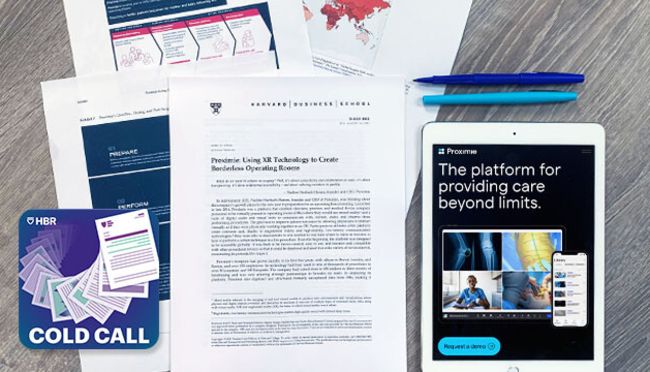
- 12 Sep 2023
- Cold Call Podcast
Can Remote Surgeries Digitally Transform Operating Rooms?
Launched in 2016, Proximie was a platform that enabled clinicians, proctors, and medical device company personnel to be virtually present in operating rooms, where they would use mixed reality and digital audio and visual tools to communicate with, mentor, assist, and observe those performing medical procedures. The goal was to improve patient outcomes. The company had grown quickly, and its technology had been used in tens of thousands of procedures in more than 50 countries and 500 hospitals. It had raised close to $50 million in equity financing and was now entering strategic partnerships to broaden its reach. Nadine Hachach-Haram, founder and CEO of Proximie, aspired for Proximie to become a platform that powered every operating room in the world, but she had to carefully consider the company’s partnership and data strategies in order to scale. What approach would position the company best for the next stage of growth? Harvard Business School associate professor Ariel Stern discusses creating value in health care through a digital transformation of operating rooms in her case, “Proximie: Using XR Technology to Create Borderless Operating Rooms.”
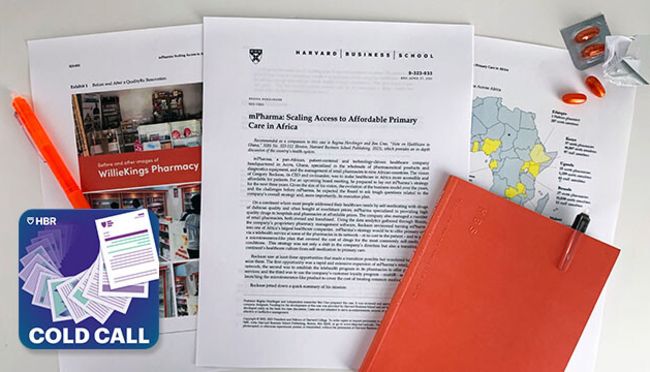
- 01 Aug 2023
- Cold Call Podcast
Can Business Transform Primary Health Care Across Africa?
mPharma, headquartered in Ghana, is trying to create the largest pan-African health care company. Their mission is to provide primary care and a reliable and fairly priced supply of drugs in the nine African countries where they operate. Co-founder and CEO Gregory Rockson needs to decide which component of strategy to prioritize in the next three years. His options include launching a telemedicine program, expanding his pharmacies across the continent, and creating a new payment program to cover the cost of common medications. Rockson cares deeply about health equity, but his venture capital-financed company also must be profitable. Which option should he focus on expanding? Harvard Business School Professor Regina Herzlinger and case protagonist Gregory Rockson discuss the important role business plays in improving health care in the case, “mPharma: Scaling Access to Affordable Primary Care in Africa.”

- 25 Jul 2023
- Research & Ideas
Could a Business Model Help Big Pharma Save Lives and Profit?
Gilead Sciences used a novel approach to help Egypt address a public health crisis while sustaining profits from a key product. V. Kasturi Rangan and participants at a recent seminar hosted by the Institute for the Study of Business in Global Society discussed what it would take to apply the model more widely.

- 23 Jun 2023
- HBS Case
This Company Lets Employees Take Charge—Even with Life and Death Decisions
Dutch home health care organization Buurtzorg avoids middle management positions and instead empowers its nurses to care for patients as they see fit. Tatiana Sandino and Ethan Bernstein explore how removing organizational layers and allowing employees to make decisions can boost performance.
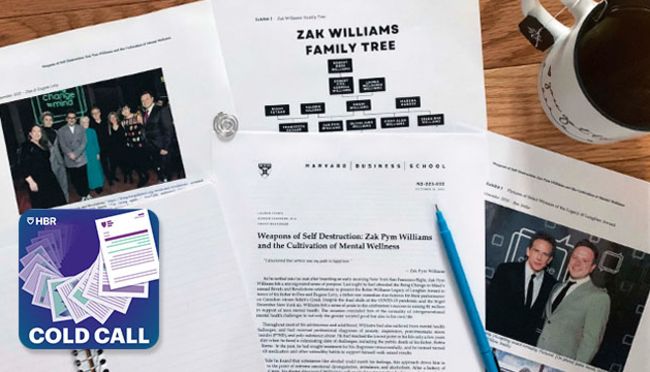
- 09 May 2023
- Cold Call Podcast
Can Robin Williams’ Son Help Other Families Heal Addiction and Depression?
Zak Pym Williams, son of comedian and actor Robin Williams, had seen how mental health challenges, such as addiction and depression, had affected past generations of his family. Williams was diagnosed with generalized anxiety disorder, depression, and post-traumatic stress disorder (PTSD) as a young adult and he wanted to break the cycle for his children. Although his children were still quite young, he began considering proactive strategies that could help his family’s mental health, and he wanted to share that knowledge with other families. But how can Williams help people actually take advantage of those mental health strategies and services? Professor Lauren Cohen discusses his case, “Weapons of Self Destruction: Zak Pym Williams and the Cultivation of Mental Wellness.”
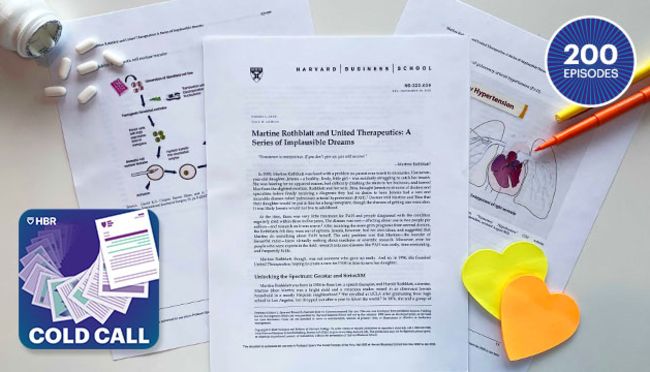
- 26 Apr 2023
- Cold Call Podcast
How Martine Rothblatt Started a Company to Save Her Daughter
When serial entrepreneur Martine Rothblatt (founder of Sirius XM) received her seven-year-old daughter’s diagnosis of Pulmonary Arterial Hypertension (PAH), she created United Therapeutics and developed a drug to save her life. When her daughter later needed a lung transplant, Rothblatt decided to take what she saw as the logical next step: manufacturing organs for transplantation. Rothblatt’s entrepreneurial career exemplifies a larger debate around the role of the firm in creating solutions for society’s problems. If companies are uniquely good at innovating, what voice should society have in governing the new technologies that firms create? Harvard Business School professor Debora Spar debates these questions in the case “Martine Rothblatt and United Therapeutics: A Series of Implausible Dreams.” As part of a new first-year MBA course at Harvard Business School, this case examines the central question: what is the social purpose of the firm?
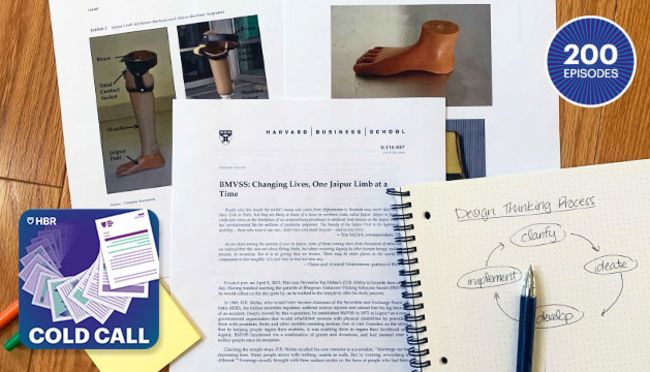
- 25 Apr 2023
- Cold Call Podcast
Using Design Thinking to Invent a Low-Cost Prosthesis for Land Mine Victims
Bhagwan Mahaveer Viklang Sahayata Samiti (BMVSS) is an Indian nonprofit famous for creating low-cost prosthetics, like the Jaipur Foot and the Stanford-Jaipur Knee. Known for its patient-centric culture and its focus on innovation, BMVSS has assisted more than one million people, including many land mine survivors. How can founder D.R. Mehta devise a strategy that will ensure the financial sustainability of BMVSS while sustaining its human impact well into the future? Harvard Business School Dean Srikant Datar discusses the importance of design thinking in ensuring a culture of innovation in his case, “BMVSS: Changing Lives, One Jaipur Limb at a Time.”

- 31 Mar 2023
- Research & Ideas
Can a ‘Basic Bundle’ of Health Insurance Cure Coverage Gaps and Spur Innovation?
One in 10 people in America lack health insurance, resulting in $40 billion of care that goes unpaid each year. Amitabh Chandra and colleagues say ensuring basic coverage for all residents, as other wealthy nations do, could address the most acute needs and unlock efficiency.

- 13 Mar 2023
- Research & Ideas
The Power of Personal Connections: How Shared Experiences Boost Performance
Doctors who train together go on to provide better patient care later in their careers. What could teams in other industries learn? Research by Maximilian Pany and J. Michael McWilliams.

- 10 Feb 2023
- Research & Ideas
COVID-19 Lessons: Social Media Can Nudge More People to Get Vaccinated
Social networks have been criticized for spreading COVID-19 misinformation, but the platforms have also helped public health agencies spread the word on vaccines, says research by Michael Luca and colleagues. What does this mean for the next pandemic?
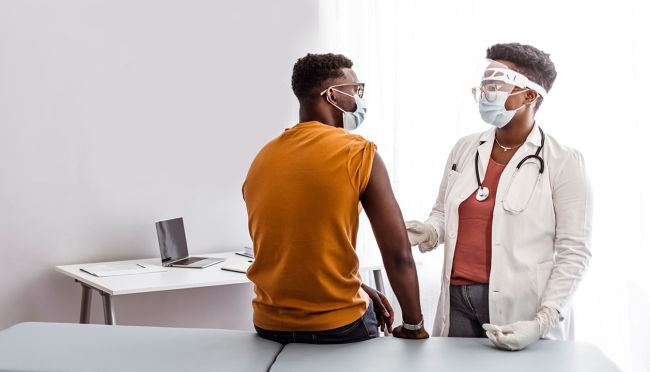
- 12 Dec 2022
- Research & Ideas
Buy-In from Black Patients Suffers When Drug Trials Don’t Include Them
Diversifying clinical trials could build trust in new treatments among Black people and their physicians. Research by Joshua Schwartzstein, Marcella Alsan, and colleagues probes the ripple effects of underrepresentation in testing, and offers a call to action for drugmakers.

- 06 Sep 2022
- Research & Ideas
Curbing an Unlikely Culprit of Rising Drug Prices: Pharmaceutical Donations
Policymakers of every leaning have vowed to rein in prescription drug costs, with little success. But research by Leemore Dafny shows how closing a loophole on drugmaker donations could eliminate one driver of rising expenses.

- 22 Aug 2022
- Research & Ideas
Can Amazon Remake Health Care?
Amazon has disrupted everything from grocery shopping to cloud computing, but can it transform health care with its One Medical acquisition? Amitabh Chandra discusses company's track record in health care and the challenges it might face.

- 14 Mar 2022
- Research & Ideas
Lessons from COVID-19: The Business Skills Doctors Need
The pandemic forced many physicians to become supply chain experts and strategic planners. Robert Huckman and colleagues offer a roadmap for teaching doctors the management and leadership skills they need—before the next public health crisis. Open for comment; 0 Comments.

- 24 Feb 2022
- Op-Ed
Want to Prevent the Next Hospital Bed Crisis? Enlist the SEC
After two years of COVID-19, many hospitals still haven't figured out how to manage the overwhelming wave of patients that flood ICUs during each surge. Regina Herzlinger and Richard Boxer offer a novel solution. Open for comment; 0 Comments.
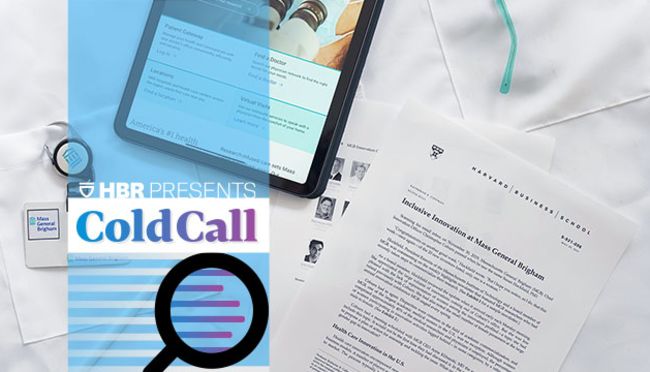
- 16 Nov 2021
- Cold Call Podcast
Can Mass General Brigham Diversify Its Community of Innovators?
In November 2019, Mass General Brigham (MGB) was the largest recipient of National Institutes of Health funding in the world. The Innovation Office, led by Chief Innovation Officer Chris Coburn, sought to capitalize on that funding – with the goal of commercializing research done at the hospital to generate revenue and improve patient care. But CEO Anne Klibanski and other key stakeholders had a serious concern: although women comprised approximately 40 percent of the medical researchers and physicians at MGB, the percentage of women participating in innovation activities lagged behind. Associate Professor Katie Coffman, Coburn, and MGB’s managing director of administration and strategy Diana Schwartzstein discuss how they identify the main sources of the disparities and find the right strategy to expand and diversify MGB’s community of innovators in the case, “Inclusive Innovation at Mass General Brigham.” Open for comment; 0 Comments.

- 02 Jun 2021
- Research & Ideas
A Rare Find in Health Care: A Simple Solution to Racial Inequity
Research by Amitabh Chandra offers a stark new explanation for racial disparities in heart attack survival rates—a problem with immediate answers. Open for comment; 0 Comments.

- 30 Mar 2021
- Working Paper Summaries
Kidney Exchange: An Operations Perspective
Kidney exchange has become a standard form of transplantation in the United States and a few other countries in part because of exchange process improvements. However, much more needs to be done: There are still many more patients in need of transplants than can be saved.

Slim Chance: Drugs Will Reshape the Weight Loss Industry, But Habit Change Might Be Elusive
Medications such as Ozempic, Wegovy, and Mounjaro have upended a $76 billion industry that has long touted lifestyle shifts as a means to weight loss. Regina Herzlinger says these drugs might bring fast change, especially for busy professionals, but many questions remain unanswered.